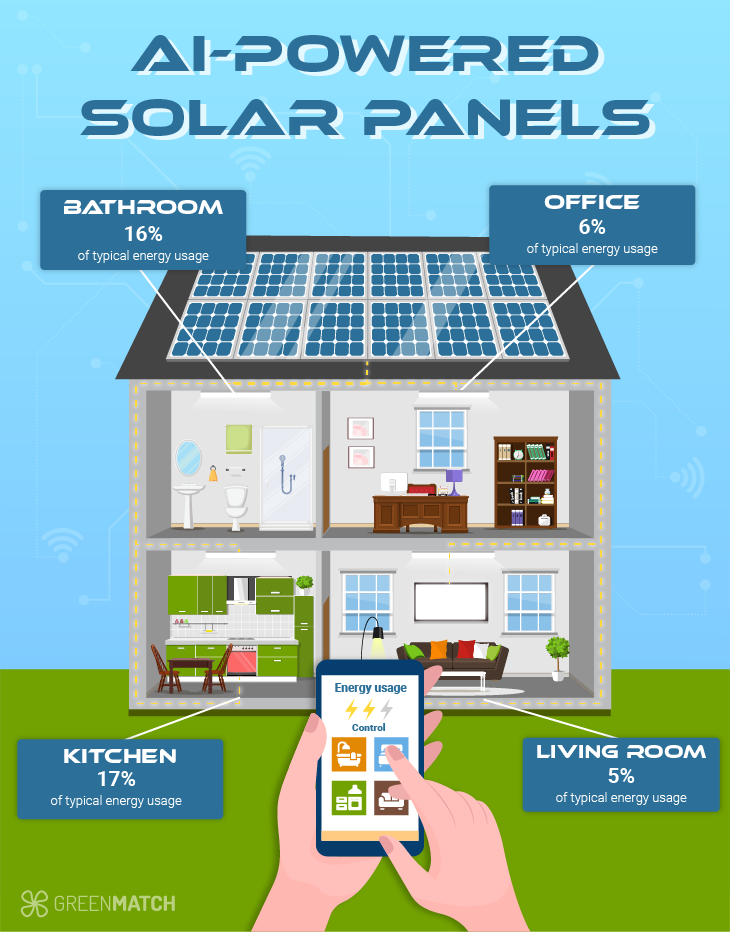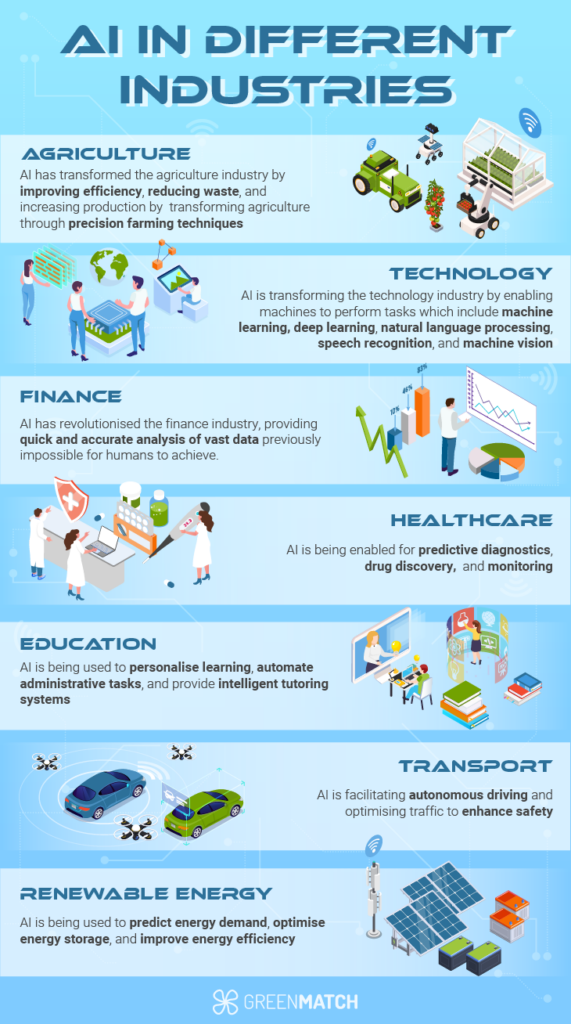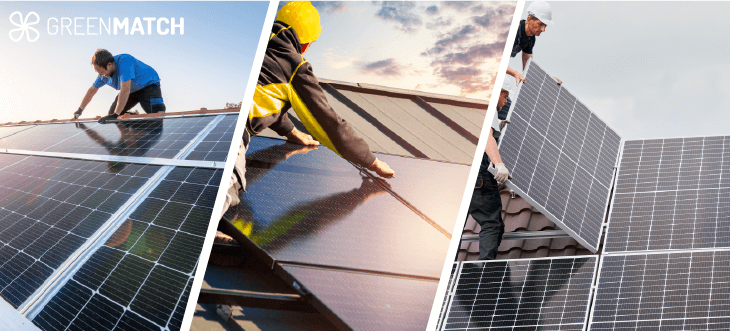Answer these simple questions and we will find you the BEST prices
Which type of solar quotes do you need?
It only takes 30 seconds
100% free with no obligation

Get up to 4 quotes by filling in only 1 quick form

Slash your energy bills by installing solar panels

For the average 2-3 bedroom house
- GreenMatch
- Blog
- Maximising Solar Energy Output with Artificial Intelligence
Maximising Solar Energy Output with Artificial Intelligence (AI)

As of late, an evident surge in the application of solar panels in the UK for generating ecologically-aware power has been observed. The popularity that this source of power generation has garnered continues to soar as more people embrace its use and benefits. In the present day and age, capitalising on artificial intelligence (AI) to implement profound comprehension patterns is of the utmost importance. The reason for doing so lies in its ability to refine its output while simultaneously minimising expenses.
Optimising solar panel performance and cost-effectiveness is essential for the widespread adoption of renewable energy. It could predict energy production accurately and improve system performance, reducing costs and increasing efficiency. We can ensure that our machinery operates efficiently using machine intellect. By adopting this methodology, we can meaningfully decrease our reliance on unsustainable energy sources in a financially sensible manner.
The importance of optimising solar panels for energy efficiency and cost savings
In the contemporary world, environmental issues are crucial, enhancing solar panel energy efficiency and reaping monetary benefits. By embarking upon this course of conduct, we can diminish our proclivity towards unreplenishable energy sources. This will enable us to curb the degree to which carbon emissions are dispersed into the environment. Optimising solar panels can lead to substantial cost savings over time, making it an economically viable solution.
Using appropriate optimisation methodologies, clean and renewable energy harnessed from the sun can be produced. It is plausible to achieve this outcome by applying diversified enhancement tactics for harnessing solar power resources efficiently. Optimising solar panels can increase the efficiency and energy delivery of the system, leading to decreased downtime and improved performance.
How artificial intelligence can help optimise solar panels
In achieving the utmost energy efficiency and cost-saving by optimising solar panels, artificial intelligence (AI) can act as a transformative force that changes standard procedures completely. AI-powered solutions ensure that solar panels operate at their fullest potential to produce clean and renewable energy, which benefits nature and our finances. We can accurately determine the optimal use of solar power through specialised algorithms for data analysis based on advanced artificial intelligence techniques.
This form of green technology leads towards significant reductions in expenses incurred by households or enterprises, making it an economically practical alternative to all other options available currently. Microinverters or DC optimisers that enable individual module monitoring are recommended for rooftops with varying shade patterns. In such systems, AI could be designed to monitor each module and microinverter so that if an anomaly (e.g., one module is underperforming compared to all others), the homeowner or PV firm could be contacted instantly to remedy the problem.
Owing mainly due to the increasing focus on environmental concerns, what makes using Artificial Intelligence-based measures for curtailing reliance upon non-replenishable sources whilst simultaneously reducing carbon footprints seems like a tremendously promising prospect with tremendous outcomes possible!

Artificial intelligence and its applications in various industries
The realm of AI, in recent years, has grown extensively throughout various domains. The application of AI facilitates machines to assimilate knowledge through experience, which aids in accomplishing tasks that conventionally necessitate the human intellect. These mechanisms are developed for gathering information and recognising patterns while deriving conclusions based on the data inputs provided. With its implementation being increasingly observed across different industries, such as healthcare and telecommunication, advanced AI-assisted procedures have led to automation resulting in heightened work efficiency levels.

The magnanimous effect that artificial intelligence could have on industries through the enhancement of operational speed, reduction in expenses and elevation of customer satisfaction is boundless. With each technological advancement in AI development, we can anticipate increased proliferation across a diversified range of sectors.
How AI is used in the solar panel industry
The solar panel industry has experienced a transformation with the appearance of AI. This technology's introduction leads to improved performance, economic benefits and added dependability towards photovoltaic systems. AI-powered designs have been seen to optimise solar panel installation and maintenance processes, predict energy production, and identify potential issues with solar panels.
By analysing and forecasting data from solar panels, AI has provided insight into how to improve energy production and reduce costs. With help from AI-powered, defect effects can now be detected, and proper diagnoses of solar panel issues allow for faster and more effective maintenance. The advancement of artificial intelligence technology attracts many with the promise of bountiful innovations in solar panel applications.
AI for home optimisation solar panels
Artificial intelligence for home optimisation of solar panels would make assessments of the potential of rooftop solar panels by developing AI methods to improve their performance. As more homes install battery + PV systems with AI-based deep learning models available, electric utilities may be able to better manage large-scale PV penetration by regulating the battery's dispatch strategy. By analysing solar energy data, AI could detect patterns and make decisions based on that data.
‘’AI developments in PV today are most useful to the utilities as they provide a means of optimising control when there is a large penetration of distributed generation comprised of PV and electrical storage on the grid. To take advantage of such systems, utilities may want to incentivise homeowners to install battery backup on their systems and provide some control to make them 'dispatchable'’. Joshua M. Pearce, PhD
Moreover, AI could detect and diagnose issues with solar panels quickly, allowing for faster and more effective maintenance. Consequently, the advantages of solar power can be relished by homeowners who need not fret over any conceivable predicaments. AI can enhance the functionality and upkeep procedures in photovoltaic (PV) power stations by identifying, sorting and forecasting abnormalities while planning scheduled maintenance events. In doing so, productivity levels are raised to achieve efficient energy delivery with minimal interruptions.
The evaluation and analysis of characteristics inherent to photovoltaic systems might be conducted with precision by artificial intelligence (AI). This analysis would allow for a projection of energy generation and expenditure, resulting in enhanced preparation techniques and streamlined operational functionality.
Real-time data analysis and predictive maintenance
To identify patterns indicating future performance based on solar conditions, environmental data, and past maintenance records. This will enable us to anticipate future challenges, repair needs, or upgrades. This will lead to higher energy production and cost savings for solar panel users.
Successful AI-powered solar panel optimisation projects
The results of attempts made in Europe to augment solar panels' efficacy using artificial intelligence are compelling. Researchers from the University of Gävle in Sweden undertook one such effort developing novel AI techniques for optimising rooftop solar panel performance, with trials conducted across Gothenburg and Uppsala exhibiting a remarkable improvement over previous attempts to enhance roofing-based energy generation accuracy. Jungle.ai, another company based out of Lisbon, Portugal, also uses AI technology to simulate production and consumption activities to forecasts based on deep learning models.
Analysing photovoltaic installation characteristics or indicators yields actionable insights on what maintenance procedures might help improve overall yield, resulting in up to 25% cost savings proactively responding before any breakdowns occur. This will further boost dependability while fostering greater renewable energy utilisation throughout continental Europe's power grid infrastructure configuration shortly!

AI improves energy efficiency and reduces costs
One can merge artificial intelligence with renewable energy and solar power sources that supplement one another to augment the effectiveness and reliability of eco-friendly applications. By implementing advanced AI algorithms, we can accurately forecast maintenance needs and execute proactive repairs, leading to a considerable decrease in reactive repair expenses while optimising the effectiveness of our solar panels. This reduces operational costs, facilitating an eco-friendly environment for future generations.
It's essential not only for telecom operators but also for all industries to utilise sustainable plans towards net-zero carbon emissions without hindering network performance or financial capabilities; hence incorporating AI into these programs will enhance their efficacy, dramatically boosting overall productivity. By integrating artificial intelligence effectively into every solar panel optimisation project, we take a step toward achieving greater environmental sustainability by making such projects more efficient!
The benefits and challenges of using AI in solar panel optimisation
The utilisation of AI to optimise solar panels brings about a plethora of benefits. These encompass but are not restricted to boosting the standards for energy efficiency by an immense degree, lowering expenses incurred during maintenance and operation procedures, and maximising power system performance via sophisticated algorithms.
Research outcomes by IRENA have highlighted that several parts of Europe witnessed considerable transformations in operating costs alongside augmented energy production levels. Through anticipated algorithms, human resources time could decrease with heightened efficacy all-inclusive ascertained whilst observing angles and positions based on real-time data towards achieving tomorrow's ecologically responsible objectives.
Explore the potential of AI in their solar panel
Might you be intrigued to delve into the untapped possibilities of artificial intelligence within your solar panel endeavours? Inquire no further, for we humbly request that you ponder implementing AI in said undertakings. Due to the widespread use of AI within solar power generation, numerous opportunities are accessible for advancing efficiency and reliability linked with PV modules. By leveraging AI-related know-how, you can predict solar energy output, and energy consumption, optimise usage and improve electric-network situational awareness, ultimately reducing cost.
With the help of machine learning techniques, you can model concentrating solar thermal power plant operations to assist human operators in their decisions. So, why explore the potential of AI in your solar panel projects? By availing of AI's assistance, you can enhance your solar energy facilities' effectiveness and dependability while contributing towards an eco-friendly tomorrow.

Inemesit is a seasoned content writer with 9 years of experience in B2B and B2C. Her expertise in sustainability and green technologies guides readers towards eco-friendly choices, significantly contributing to the field of renewable energy and environmental sustainability.
We strive to connect our customers with the right product and supplier. Would you like to be part of GreenMatch?

Stay up to date with energy saving tips and grant alerts
Receive offers, marketing and promotions via email from Leads.io about GreenMatch and our brands/partners to help you save.
Thank you for subscribing to our newsletter!
Your email has been successfully added to our list. We look forward to sharing our latest updates with you soon!
